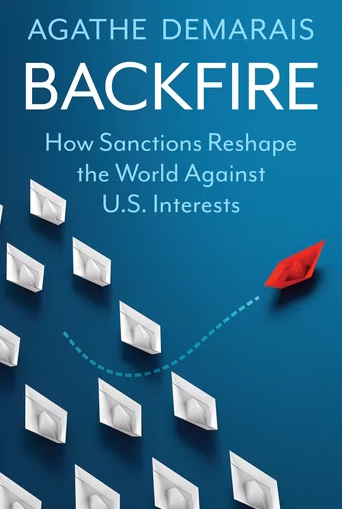How Sanctions Reshape the World Against U.S. Interests
Economic sanctions have become the weapon of choice in the United States’ diplomatic and strategic arsenal. Trade tariffs, export controls and other financial penalties offer a quick means to punish ‘bad behaviour’, whether by terrorist groups, drug cartels or national governments. Over the past two decades, the US has imposed more sanctions than the United Nations, the European Union and Canada combined.
From a government point of view, sanctions are low cost. They may be drafted by a handful of civil servants, but the burden of implementation falls on multinationals and banks. And sanctions tend to boost the approval ratings of the leaders who impose them. No wonder policymakers like to use them to fill the diplomatic space between ineffective declarations and high-risk military operations.
However, sanctions have a poor success rate, have high economic costs, and may also have massive unanticipated consequences for innocent bystanders.
North Korea is a case in point. Despite being subjected to some of the toughest sanctions ever applied, North Korea’s regime has remained in power and continued its weapons testing undeterred. In response to sanctions, Pyongyang has developed sophisticated illicit tools to generate foreign exchange and support the lifestyles of the country’s elite. Decades of sanctions have pushed North Korea deep into poverty. The burden is borne by the poor, many of whom live on the brink of starvation. By any yardstick, sanctions on North Korea are a failure.
As the use of sanctions has soared, so too have the compliance and opportunity costs for the private sector. Major deals have been lost and entire supply chains redirected due to ill-conceived measures.
By relying so heavily on sanctions, is the US shooting itself in the foot?
Agathe Demarais is the global forecasting director of the Economist Intelligence Unit. While working for the French Treasury in Russia and Lebanon she learned about sanctions firsthand. In Backfire, which will be published on 15 November, she examines the extensive downsides to US-led sanctions and suggests a way forward in a world that is increasingly polarised between liberal and authoritarian regimes.
In 2002, the US Congress considered sanctioning oil companies doing business with Sudan, to pressure the country’s leaders into ending a brutal civil war. The US administration, however, was opposed, noting that sanctions would damage American businesses, work counter to Washington’s commitment to the free movement of capital, and force multinationals to raise capital outside the US. Congress backed down, but the debate rages on.
When American founding father Benjamin Franklin in 1763 learned that Great Britain would tax its colonies’ imports, he replied, ‘You cannot hurt us without hurting yourselves.’ The same holds true of sanctions today. When the US in the 1980s restricted grain exports to the Soviet Union, Argentina and Brazil quickly filled the gap left by US companies. And when it sanctioned Iranian and Venezuelan oil exports in 2019, Russia stepped in.
Estimates put American business opportunities lost due to sanctions at as much as US$50 billion a year. And sanctions-related regulations have pushed banks’ risk and compliance costs through the roof.
Sanctions also hurt the innocent. In response to Iraq’s 1990 invasion of Kuwait, US-led sanctions cut off the country’s food and medical supplies. Estimates put the resulting death toll at up to half a million, mainly children. In 1996, Madeleine Albright, the then US ambassador to the UN, said that reining in Iraqi leader Saddam Hussein was ‘worth it’, words that she later retracted as a ‘terrible mistake’.
Demarais confirms previous findings that sanctions fail about two-thirds of the time, and that successes are often only partial. Her book includes an important discussion on when sanctions can be expected to work.
To be effective, sanctions should be short term, have a narrow goal, target a country with significant ties with the US, and be backed by American allies. In stark contrast, US sanctions tend to be long term, target dictatorships with few ties to the US, and have broad objectives such as regime change. The US often goes it alone, with little consultation with allies or other interested parties. It should therefore not be surprised when its sanctions fail.
Demarais wraps up with a discussion about the current decoupling of the US and China. She debunks the notion that decoupling would be beneficial to the US and the West. At the business level, decoupling would be difficult and enormously costly, given closely integrated global supply chains. And at the geopolitical level, decoupling would leave Beijing freer to pursue its own agenda in political hotspots like Taiwan.
The heyday of US-led sanctions is drawing to a close. Demarais predicts that a self-reliant China will increasingly undermine US sanctions on Iran, North Korea, Russia, Venezuela and other authoritarian regimes.
Backfire provides valuable pointers for policymakers. If US-led sanctions are to retain any effectiveness, Washington will need to rethink its approach. It should become more strategic, learn from past failures, work more closely with other governments, and pay heed to the impact of sanctions on the strategic thinking of both allies and adversaries.
Robert Wihtol is an adjunct faculty member at the Asian Institute of Management and former Asian Development Bank country director for China and director general for East Asia.
Published by ASPI on November 2, 2022.

